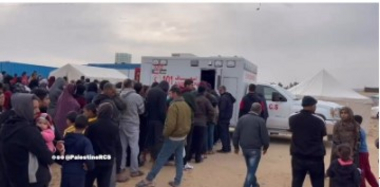GAZA AND ISRAEL
-
Between 7 October and 13 February 2024, 28,473 people were killed in Gaza and 68,146 injured, according to the Ministry of Health. In addition, over 1,200 people were killed in Israel, the vast majority on 7 October and the immediate aftermath.
-
According to the UN, more than 85% of the population in Gaza has been displaced to southern governorates, including 1.5 million people in Rafah, where increased airstrikes cause heightened concerns. Men, women and children walk for dozens of kilometres past dead bodies lying on the streets and without necessities like food and water. Thousands of people are buried under the rubble and cannot be reached for proper evacuation or burial. Many are settling along roads and in insufficient shelter solutions.
-
The medical system has collapsed. According to the WHO, Gaza has 21 hospitals that are no longer functioning, 13 partially functioning, and two minimally functioning. Those still operating are doing so at over 200 per cent. Hospitals in the north can no longer perform surgeries yet are still receiving patients because they have nowhere else to go. Medical facilities in the south are overwhelmed with patients and displaced people. According to reports surgeries, including c-sections and limb amputations are being performed without anaesthesia. Hospitals have repeatedly been targeted, including hospitals operated by the Palestinian Red Crescent Society.
“Every hospital in the Gaza Strip is over-crowded and short on medical supplies, fuel, food and water. Many are housing thousands of displaced families. And now two more facilities risk being lost due to fighting. The cumulative impact on the health system is devastating and urgent action must be taken.”
William Schomburg, head of the ICRC’s office in Gaza
-
Food insecurity and lack of safe water continues to be a major public health concern. With a lack of clean water, public health hazards have drastically increased. Diseases outbreaks are expected, which would result in a high mortality rate, as the health system would not be able to respond. Due to the lack of fuel, water, and wheat flour, as well as due to the damage from hostilities, bakeries have not been able to operate. Families struggle to find even the most basic food. Parents sacrifice their own meals to feed their children.
-
With the weather getting colder, rain and wind coming in, the potential for flooding is very high. This creates potential hazards for sanitation. Rapidly cooling weather also means the regular flu and gastro-intestinal issues like typhoid or cholera, skin diseases or similar. With hospitals and primary health care centres already overstretched and lacking medical supplies, a vast majority of patients will go without treatment.
-
All wastewater treatment plants are currently shutdown. This means sewage is being pumped directly into the sea in the best case - consuming fuel critically needed to operate water supply system - or floods in the streets, putting the whole strip at risk of diseases outbreaks. Instances of sewage flowing in the street have been seen (including in Rafah area).
The difficulties faced by this mission illustrate the shrinking space for humanitarian actors to provide aid within Gaza, even though access is desperately needed to alleviate the catastrophic humanitarian situation (WHO).
The limited space for humanitarian actors also affects the Red Cross and Red Crescent Movement. The Palestinian Red Crescent (PRCS) has come under crossfire several times, losing 14 staff and volunteers, including several paramedics and the director of the volunteer department. On January 10th 2024, four PRCS volunteers were killed in a single event, Yusef was one of the first to arrive at the scene:
“The impact of this trauma will stay with us for years. It is a very hard thing to forget and overcome.” Yusef Abdel Qadar, PRCS volunteer
The PRCS and the ICRC with support of the wider movement are working night and day to provide humanitarian relief to the affected population. The IFRC focuses on supporting the neighbouring countries that are also impacted by the conflict.
-
In Austria, we have advocated for the compliance with international humanitarian law – especially the protection of medical staff and civilians – towards national stakeholders and started a petition to call for the protection of the international humanitarian law. Support the petition and read more about international humanitarian law.
-
Additionally, we have been able to secure government funding for the IFRC regional appeal, supporting Egypt, Jordan, Lebanon, and Syria. The appeal focuses on support for the Egyptian Red Crescent, as the ERCS coordinates all relief goods passing through Egypt into Gaza.
-
Government funding was also provided to the ICRC appeal for Israel and the occupied territories, particularly supporting the civilian population in Gaza.
-
Our colleague Georg Ecker deployed with the ICRC as a WASH coordinator to Egypt to assess the water and sanitation situation in Gaza.

